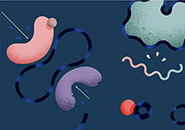
Scientific Discipline
Biochemistry, Molecular Biology
Related Links
Host Institution
University of Texas Southwestern Medical Center
Current Position
Dr. Chen is also George L. MacGregor Distinguished Chair in Biomedical Science and a professor of molecular biology at the University of Texas Southwestern Medical Center.
Current Research
Innate Immune Sensing and Signaling of Nucleic Acids
Research
Biography
Raised in a remote village in southern China, Zhijian "James" Chen earned an undergraduate degree in biology from Fujian Normal University before he ever saw snow. Then he won an overseas scholarship by placing first on a biochemistry exam. Chen used it for graduate studies at the State University of New York at Buffalo, where he earned a Ph.D. and made up for his early years of snow deprivation.
Now, after spending some time in industry, he has returned to academia at the University of Texas Southwestern Medical Center. There he studies ubiquitin, a small protein that, until recently, was thought to have only one molecular function—to tag other proteins for destruction by the cell's proteasome, a structure that acts as a garbage disposal for unwanted proteins.
Chen has uncovered an unexpected second function for ubiquitin. In the course of studying the NF-κB pathway—a central player in immune and inflammatory responses—he found that ubiquitin also activates protein kinases and is central to cytokine signaling, innate immunity, and adaptive immunity. Chen has identified the role of a number of components of the NF-κB cascade in connection with ubiquitin activity. Since that initial discovery, Chen has sought to understand the mechanisms and pathways of ubiquitin signaling, especially in regard to immunity and cancer.
Accumulating evidence strongly suggests that NF-κB activation by some members of the epidermal growth factor receptor family plays a crucial role in the development of human cancers, such as breast cancer. However, the mechanism by which these growth factor pathways activate NF-κB is poorly understood. Chen hopes to fill in the gaps in the understanding of NF-κB activation for both T cell receptor and growth factor receptor pathways. These studies have the potential to extend the role of ubiquitin signaling beyond inflammation and immunity, into the realm of growth control and cancer.
Chen has contributed to proteasome research and drug development, as well. While at ProScript Inc., a biotech company born in a basement in Boston's Kendall Square (now part of Millennium Pharmaceuticals), he developed assays to identify and optimize the proteasome inhibitor Velcade, a drug approved in 2003 by the Food and Drug Administration to treat multiple myeloma.
Chen's three years at ProScript enabled him to do molecular biology and work on drug development. Once the company grew and became more focused on product development, he realized the basic science questions excited him most, so he returned to academia. He says the academic freedom, intellectual diversity, and exposure to different areas of biology at the University of Texas Southwestern are perfect for him. And, he adds, he got his fill of snow in Buffalo and Boston.
Articles & News
Research Papers
Selected Research Papers




